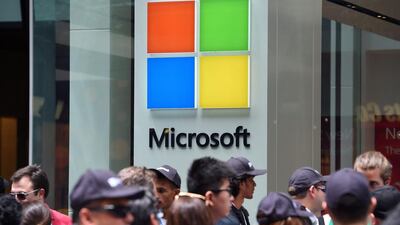Which of these five tech giants – Alphabet, Amazon, Apple, Facebook and Microsoft – is the best bet for investors? It’s a question many struggle with when deciding where to park their money.
There are many ways to make that determination, but the answer is surprisingly simple if one key factor – revenue diversity – is kept in mind. By that measure, the clear-and-away choice is Microsoft.
Sure, the software company isn’t as sexy as the other names on the list. It isn’t working on self-driving cars and it isn’t developing drones that can deliver goods to people’s houses. Not that we know of, at least.
And sure, it’s also strongly associated with personal computers – a business that seems to be in terminal decline – thanks to Windows, the operating system software it is synonymous with.
But, as a recently published chart from the data storytelling firm Visual Capitalist points out, Microsoft does have revenue diversity in a way that the other tech companies don’t.
That’s a really good thing for investors concerned about future returns.
Windows, the software that used to power just about every computer in the world, is actually trending towards being just a tiny part of Microsoft’s overall business.
According to Visual Capitalist, the OS makes up just 9 per cent of the company’s revenue, a big shift from just six years ago when it accounted for about a quarter.
The biggest chunk of current revenue, or about 28 per cent, comes from the other bit of software Microsoft is usually associated with: Office. But, unlike Windows, Office isn’t necessarily in decline – it’s accounting for about the same revenue percentage as it did in 2011.
The company deserves credit for convincing users that Office has continued value at a time when free software is plentiful, and for successfully transitioning its productivity suite from being something that people buy on discs to an online service they subscribe to.
Still, Windows and Office together – Microsoft’s legacy products – account for just over a third of current revenue, while the rest comes from a variety of sources. Windows servers and Azure cloud services make up 22 per cent, Xbox videogames are 11 per cent, Bing and advertising are 9 per cent, Surface hardware is 5 per cent and “other” accounts for 18 per cent.
None of those categories are dominant, which again is a good thing.
The other four tech giants are nowhere near as diverse.
Apple rakes in nearly two-thirds of its revenue from the iPhone, with a further 11 per cent from Mac computers and 10 per cent from iPads. That means a whopping 84 per cent comes from hardware, while 11 per cent is from online services such as iTunes and 5 per cent is from “other”. Apple is working at building up its services business, but it’s slow going for now.
Google’s parent Alphabet is even more focused, with 88 per cent of revenue coming from advertising and 11 per cent from “other”, which includes the Google Play store and hardware products such as the Pixel phone.
Amazon, meanwhile, counts 72 per cent of its revenue from goods sold and a further 18 per cent from its media division, which involves marketing and affiliates, and 9 per cent from Amazon Web Services cloud hosting.
Facebook is the least diversified of the bunch, with 97 per cent of its revenue derived from ads.
Having all your eggs in one basket is never a good idea – either when you’re actually, physically carrying eggs, or when you’re investing – but it’s especially risky when it comes to technology. Trend cycles move fast and new developments quickly make old revenue lines obsolete.
At the opposite extreme, there’s always the risk that regulators will come calling on any company that establishes too much power in a given market.
Calls for the possible break-up of Google and Facebook for their steadily increasing dominance of the advertising business, for example, are starting to ramp up.
Amazon is dealing with similar concerns over its growing power in the publishing and retail industries.
Microsoft finds itself in an ironic position. When it comes to monopoly concerns, the company has been there and done that – its antitrust settlement over OS domination with the US department of justice happened back in 2001.
Since then, the company has not dominated any business. Rather, it finds itself as just one of many competitors across a number of fields. If anyone is immune to regulatory or antitrust attention, it’s therefore Microsoft.
The company formerly known as just the Windows maker has successfully spread its risk in more ways than one. For that reason alone, it has to be appealing to investors.
The tech week’s winner and loser
Winner of the Week: Tesla. The electric car maker's stock is hitting new highs as it appears the company will start production on its Model 3 vehicle as expected, in July. Tesla is now being valued at about US$54 billion.
Loser of the Week: British Airways. The airline was forced to cancel more than 1,000 flights out of Heathrow and Gatwick this past weekend because of a major IT systems failure. The situation had a major knock-on effect as many travellers going through London had their plans disrupted.
Peter Nowak is a veteran technology writer
business@thenational.ae
Follow The National's Business section on Twitter

